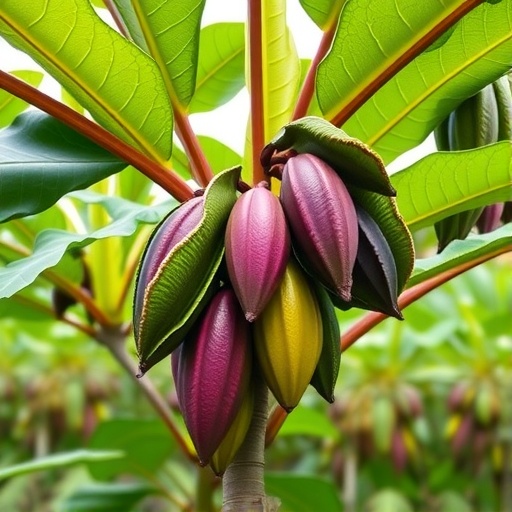In a remarkable breakthrough poised to revolutionize the cocoa industry, researchers at Penn State University have developed disease-resistant cacao plants through innovative gene-editing technology. The endeavor addresses a significant setback faced by cacao farmers worldwide, particularly due to the black pod disease incited by the phytophthora species. This pathogen can devastate cacao crops and is responsible for yield losses of up to 30% globally, threatening an industry valued at approximately $135 billion annually. The scientific team’s research heralds a future where cacao cultivation may not only become more robust but also sustainable.
The focal point of this research lies in the manipulation of the gene TcNPR3 within cacao plants. By employing CRISPR-Cas9 technology, a sophisticated tool used for precise genetic modifications, the researchers have successfully created cacao plants exhibiting significantly smaller disease lesions when exposed to the pathogen. In comparative studies, edited plants displayed 42% reduced lesions than their non-edited counterparts, effectively showcasing increased resistance to the destructive effects of the fungal pathogen. This accomplishment stands to significantly alter the landscape of cacao farming by potentially lessening reliance on harmful, costly chemical treatments currently used by farmers.
Mark Guiltinan, a professor of plant molecular biology and the team leader of this distinguished research, highlighted the socioeconomic challenges facing cacao farmers. Many of these farmers operate with limited resources, making it difficult for them to implement expensive disease-control measures effectively. Additionally, the stigma associated with traditional genetic modification approaches, which often involve foreign DNA, further complicates matters. This innovative approach, however, seeks to circumvent both significant hurdles — offering a solution that improves plant defenses while remaining free of foreign genetic material.
The use of CRISPR-Cas9 effectively acts as “molecular scissors,” deftly targeting and modifying specific DNA sequences to enhance the cacao plant’s immune response. The breakthrough is notable in that it represents the first instance of transgene-free cacao plants, which eliminates regulatory concerns while enhancing consumer acceptance. The modifications, while sophisticated, are accomplished without introducing foreign DNA, meaning these plants are subject to different regulatory standards than conventional genetically modified organisms, thus easing their path to market.
Researchers meticulously modified the TcNPR3 gene, known to function as a molecular brake on the cacao plant’s natural defense mechanisms. By disabling this gene, the researchers effectively allowed the plant to enter a heightened state of alert, enhancing its innate defense capacity against threats posed by pathogens. This analogy likens the process to transitioning a security system from a standby mode to an active alert state, thereby enabling the plant to better anticipate and defend against attacks.
The novel aspect of this research extends beyond merely editing the gene; it incorporated traditional plant breeding techniques to eliminate any residual foreign DNA associated with the gene-editing process itself. This feature holds immense significance in the regulatory landscape, especially since it aligns with current USDA classifications regarding biotechnology. The USDA has identified these modified cacao plants as non-genetically modified organisms, which contributes to a promising framework for broader acceptance and utilization.
As the researchers look ahead, their focus is on assessing the efficacy of these modified plants outside controlled environments. Testing in tropical regions, where cacao is primarily grown, will provide vital insights into how well these plants perform in real-world conditions. Ensuring these plants can thrive in their native habitat while maintaining disease resistance is the next frontier in this ongoing research.
Furthermore, the research team is not stopping at a single genetic modification. They are actively investigating additional targets to enhance disease resistance further and exploring new gene-editing methods. The vision for a second generation of modified cacao lines aims to develop even more resilient plants to support the agricultural community and meet consumer demand amid the growing environmental challenges faced by traditional farming methods.
The implications of this research reach far beyond the immediate benefits to farmers and crop yields. As Guiltinan articulates, the work represents an intersection of traditional agricultural methodologies and modern bioengineering techniques, highlighting how these tools can be harmonized within existing regulations. This exploration embraces a future where agricultural innovation leads to sustainable practices, ensuring the longevity of cacao cultivation and the future of chocolate consumption.
The urgency of these developments cannot be overstated, as millions of cacao farmers face uncertain futures. This research not only promises solutions to current agricultural challenges but also emphasizes a proactive approach toward creating resilience in plants through targeted genetic strategies. By fostering innovation within established regulatory frameworks, the scientific community can address pressing agricultural challenges while meeting consumer expectations of health and safety.
In conclusion, the journey of developing disease-resistant cacao plants represents a significant leap toward ensuring food security and sustainability in agriculture. With continued investment in scientific research and technology, the potential for addressing agricultural challenges such as disease susceptibility in cacao can pave the way toward a more secure and prosperous future for farmers and consumers alike. The team at Penn State’s pursuit of enhancing cacao resilience encapsulates a crucial step in shaping a more reliable cocoa industry for all stakeholders.
Subject of Research: Disease-resistant cacao plants
Article Title: Reduced Susceptibility to Phytophthora in Non-Transgenic Cacao Progeny Through CRISPR–Cas9 Mediated TcNPR3 Mutagenesis
News Publication Date: 9-Sep-2025
Web References: Plant Biotechnology Journal
References: DOI – 10.1111/pbi.70365
Image Credits: Mark Guiltinan/Penn State
Keywords
Plant sciences, gene editing, cacao, disease resistance, biotechnology.
Tags: combating black pod disease in cacaoCRISPR-Cas9 technology in agriculturedisease-resistant cacao developmentfuture of cocoa industry sustainabilitygene editing cacao plantsgenetic modifications in plantsimproving cocoa crop yieldsinnovative agricultural researchPenn State University cacao studyphytophthora pathogen impactreducing reliance on chemical treatmentssustainable cacao farming practices





